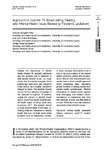Approach to Spanish TV Broadcasting Dealing with Mental Health Issues Related to Pandemic Lockdown

Use this link to cite
http://hdl.handle.net/2183/33180
Except where otherwise noted, this item's license is described as Atribución-NoComercial-CompartirIgual 3.0 España
Collections
- Investigación (FCOM) [208]
Metadata
Show full item recordTitle
Approach to Spanish TV Broadcasting Dealing with Mental Health Issues Related to Pandemic LockdownDate
2022Citation
Sanjuán Pérez, A., Videla Rodríguez, J. J., Nozal Cantarero, T., & Martínez Costa, S. (2022). Approach to Spanish TV Broadcasting Dealing with Mental Health Issues Related to Pandemic Lockdown. Tripodos, (52), 35-50. https://doi.org/10.51698/tripodos.2022.52p35-50
Abstract
[Abstract]: Despite the importance of mental health matters for people’s well-being and the essential role of television to help spread medical issues, our study shows that the media coverage of this subject has been poor and somehow trivial during the so-called “pandemic fatigue” in Spain. This research focuses on the 24-hour television broadcast of five channels throughout 16 months, coding the content to identify trends and to know how media covered men-tal health topics all along seven days in January 2021. The analysis reveals a trivial representation of the topic, in-cluding irrelevant references to mental health that may not help make visible problems such as depression, anxiety, or stress. Instead, there seems to be a lack of rigorous analysis of the mental health conditions arising after the pan-demic. We can infer that private broad-casters have a more suitable approach when presenting data, describing people involved or taking advice from mental health professionals. Effective information on mental health requires deep messaging and medical recom-mendations or statements, but from this research, it turns out that there is a touch of frivolity in the way television approaches mental health issues.
Keywords
Mental health
Pandemic fatigue
Television
COVID-19
Content analysis
Pandemic fatigue
Television
COVID-19
Content analysis
Editor version
Rights
Atribución-NoComercial-CompartirIgual 3.0 España
ISSN
1138-3305






